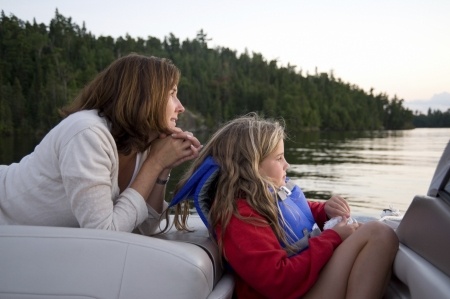Tips for Boating with Children
April 18, 2016 | Category: Boating Accidents | ShareBoating accidents happen too often and can cause serious injuries to children. With thousands of miles of beautiful coastline, Florida is ideal for boating with families, and many enjoy spending quality time together. A challenge for parents is cruising safely with children.
Boating Accident Statistics
The U.S. Coast Guard counted 4,064 accidents that involved 610 deaths, 2,678 injuries and approximately $39 million dollars of damage to property as a result of recreational boating accidents in 2014 (latest data).
 Twelve children under age thirteen lost their lives while boating in 2014. Seven children (approximately 58%) died from drowning, according to the American Boating Association, which is a member organization with a “common mission of working together to improve the safety, affordability, environmental cleanliness, growth and fun of our sport (boating).”
Twelve children under age thirteen lost their lives while boating in 2014. Seven children (approximately 58%) died from drowning, according to the American Boating Association, which is a member organization with a “common mission of working together to improve the safety, affordability, environmental cleanliness, growth and fun of our sport (boating).”
The CDC (Centers for Disease Control) reports that about one in five people who die from drowning while boating are children 14 and younger. For every child who dies from drowning, another five are treated in emergency rooms for nonfatal submersion injuries.
Broward County Florida teens were also boat accident victims. In August 2015 one teen died and five others were sent to the emergency room following an accident involving a 13-foot Boston Whaler’s crashing into a low-lying bridge in dark waters about midnight. The teens were believed to be younger than 18 according to the Sun Sentinel.
Why are children being injured while boating?
Authorities report that children and teens can engage in “horseplay,” lose their balance, fall and injure themselves. Without life jackets, there is more of a tendency for a child or teen to fall overboard and not survive. When relaxing the children and/or teens may dangle arms or feet over side rails or swim platforms which would allow them to come in contact with a propeller.
Legal requirements for boat operators
Boat operators have a legal responsibility of due care for passengers, and this duty increases when children are onboard. Florida statute chapter 327 gives special attention to the role of the ship’s operator, the captain. The law requires the ship’s operator to operate the boat in a “reasonable and prudent manner” which is not operating a vessel in a reckless or dangerous manner. The boat must also be equipped with U.S. Coast Guard-approved life jackets which are required to be in good condition, be of the proper size for all intended wearers, and readily available.
Federal law goes further and requires that each child under the age of 13 who is underway on a recreational vessel must wear an appropriate U.S. Coast Guard-approved personal flotation device, unless the child is below deck or in an enclosed cabin.
“Enjoying boating activities is one of the reasons many come to Florida. Following are ten tips from the non-profit Sea Tow Foundation which is dedicated to education and boating safety. We at Spivey Law Firm, Personal Injury Attorneys, P.A. hope that all boaters will not only review these ten tips but follow them,” said Fort Myers Boating Accident Attorney, Randall Spivey.
Ten tips for safe boating with children
Pre-planning helps ensure that time spent on the water is fun and safe.
- Life jackets save lives. Children should always be wearing a life jacket while boating.
- Make sure the life jacket fits properly.
- Get kids in the habit of putting on sunblock, a hat and their life jacket before they get in the boat.
- Have everyone stow gear and water toys away neatly.
- Be sure there are no loose lines, mops, buckets etc. on deck that someone might trip over.
- Give kids a safety lesson before leaving the dock. No running or sitting on the side rails, foredeck, or swim platform when the boat is underway. Follow the captain’s orders.
- Be sure everyone knows how to operate the boat’s VHF radio in case of emergency.
- When you tow kids behind the boat on skis, a wake board or an inflatable water toy, be sure to designate an adult or teen to be the official watcher.
- Teach kids hand signals they can use while being towed to tell you to speed up, go slower or stop.
- Give kids assigned seats on the boat while docking and make sure they know to keep their hands and feet inside the boat.
Swimming lessons can also keep your child safer while boating and around open water. For more information about swimming lessons visit: www.usswimschools.org.
Attorney Spivey recommends, “If you or a loved one is involved in a boating accident, contact the experienced team at Spivey Law Firm, Personal Injury Attorneys, P.A. as soon as possible.”
Fort Myers Boating Accident Attorney, Randall L. Spivey is a Board Certified Trial Attorney – the highest recognition for competence bestowed by the Florida Bar and a distinction earned by just one (1%) percent of Florida attorneys. He has handled over 2,000 personal injury and wrongful death cases throughout Florida. For a free and confidential consultation to discuss your legal rights, contact the Spivey Law Firm, Personal Injury Attorneys, P.A., in Lee County at 239.337.7483 or toll free at 1.888.477.4839,or by email to Randall@SpiveyLaw.com. Visit SpiveyLaw.com for more information. You can contact Spivey Law Firm, Personal Injury Attorneys, P.A.in Charlotte County at 941.764.7748 and in Collier County 239.793.7748.

